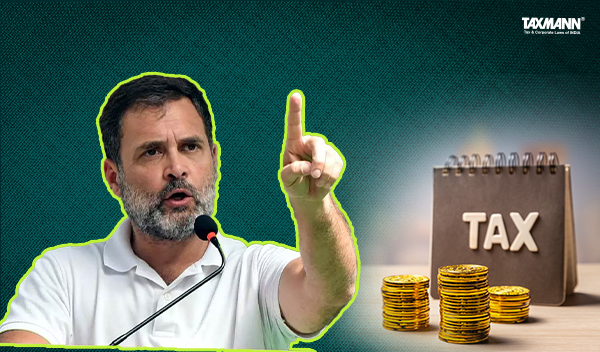[Opinion] Indian National Congress’ Income Tax Dispute | Analysis
- Blog|News|Income Tax|
- 3 Min Read
- By Taxmann
- |
- Last Updated on 27 March, 2024

CA Aman Rajput – [2024] 160 taxmann.com 581 (Article)
One of the India’s prominent political party that is The Indian National Congress, got trapped into a legal battle with the income tax authorities. What happened was, It wished to seek exemption under Section 13A of the Income-Tax Act, 1961 for the assessment year 2018-19, the party faced allegations of non-compliance with tax regulations.
What is section 13A of Income Tax Act?
According to this section, any income a political party receives from voluntary contributions or any interest, dividend, or rent from its assets is not included in the party’s total income for taxation. In simple words this means these type of income are exempt of any taxation
Hence under Section 13A, political parties are eligible for tax exemption on their income provided they adhere to certain conditions.
What are the conditions?
The main condition for registered political party is that it is mandatorily required to file their Income Tax Returns every year this is as per Section 139 (4B) of Income Tax Act, 1961, returns of a political party is required to be filed of a particular financial year, audited and submitted by the 30th of September of relevant Assessment Year.
The conditions for availing exemptions include timely filing of income tax returns and complying with restrictions on receiving cash donations exceeding a specified amount. Currently this specified amount is Rs. 2000/-. However, the Indian National Congress was accused of violating these two provisions, leading to the denial of their exemption claim under section 13A.
The recent decision by the Income Tax Appellate Tribunal (ITAT) Indian National Congress All India Congress Committee v. Dy. CIT [2024] 160 taxmann.com 260 (Del.-Trib.) which was regarding the Indian National Congress appeal for a stay on tax recovery made us know about the non-compliances of tax law compliance by the party and the legal proceedings going on.
In the above case, the ITAT dismissed the Indian National Congress’s request for a stay on the collection of tax demanded for the assessment year 2018-19, this decision was taken by the ITAT because, In the assessment of tribunal, the party delayed in determining the appeal which was not caused by the Revenue, and the Indian National Congress failed to present a prima facie case against the actions of the Assessing Officer
ITAT’s ruled keeping the assessment of the AO’s actions at the centre, which were deemed prima facie consistent with the law, hence seemed justified by the tribunal. The findings of Assessing officer included the alleged violations of section 13A exemption due to the parties’ failure to file Income Tax Returns before the due date i.e. on timely basis and acceptance of cash donations exceeding the prescribed limit of Rs. 2000.
Despite being offered the option to Pre-deposit the 20% of the amount involved in pending appeal, the party did not comply with this requirement nor did it file an appeal against the AO’s decision. This lack of proactive action further weakened the Indian National Congress position before the tribunal.
Moreover, the timeline of events presented during the proceedings highlighted the parties’ pattern of seeking adjournments, contributing to delays in the adjudication process hence was impacting the revenue. Despite multiple opportunities by the AO, along with suggestions for expeditious disposal of the pending appeal, the counsel of the party declined to agree upon and pursue them.
Hence the ITAT’s decision on 08th of March 2024 in the above case have focussed on the importance of timely compliance and proactive legal action in the case of tax disputes, focussing on the need for parties as well as general public to diligently address legal proceedings and present strong prima facie cases to support their appeals.
Click Here To Read The Full Article
Disclaimer: The content/information published on the website is only for general information of the user and shall not be construed as legal advice. While the Taxmann has exercised reasonable efforts to ensure the veracity of information/content published, Taxmann shall be under no liability in any manner whatsoever for incorrect information, if any.

Taxmann Publications has a dedicated in-house Research & Editorial Team. This team consists of a team of Chartered Accountants, Company Secretaries, and Lawyers. This team works under the guidance and supervision of editor-in-chief Mr Rakesh Bhargava.
The Research and Editorial Team is responsible for developing reliable and accurate content for the readers. The team follows the six-sigma approach to achieve the benchmark of zero error in its publications and research platforms. The team ensures that the following publication guidelines are thoroughly followed while developing the content:
- The statutory material is obtained only from the authorized and reliable sources
- All the latest developments in the judicial and legislative fields are covered
- Prepare the analytical write-ups on current, controversial, and important issues to help the readers to understand the concept and its implications
- Every content published by Taxmann is complete, accurate and lucid
- All evidence-based statements are supported with proper reference to Section, Circular No., Notification No. or citations
- The golden rules of grammar, style and consistency are thoroughly followed
- Font and size that’s easy to read and remain consistent across all imprint and digital publications are applied



 CA | CS | CMA
CA | CS | CMA
